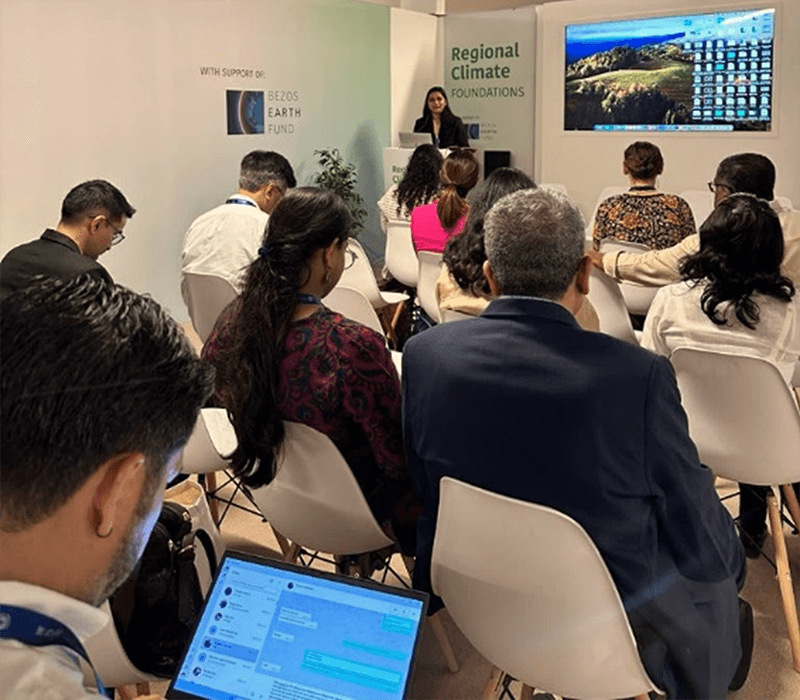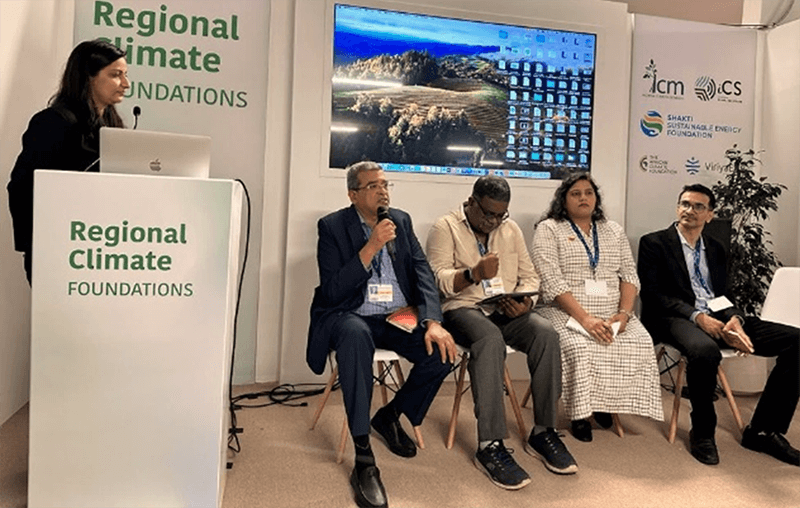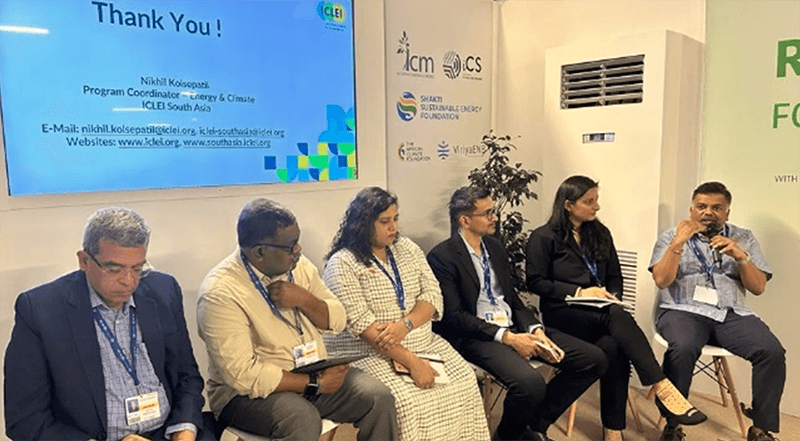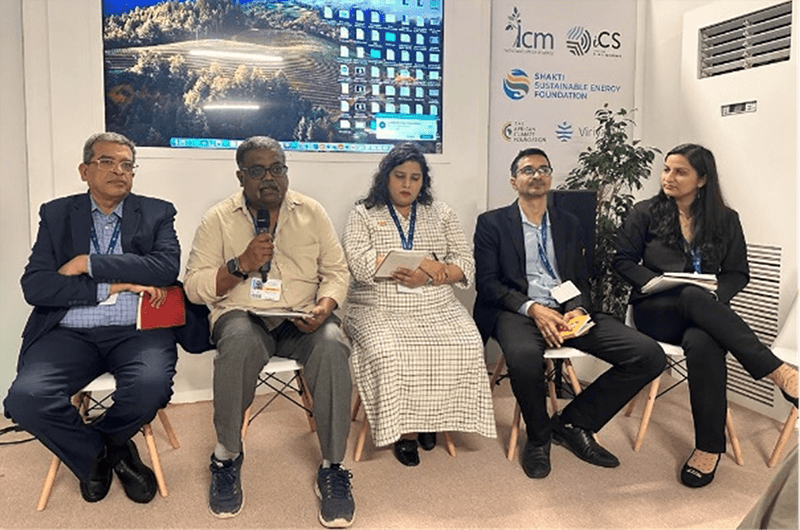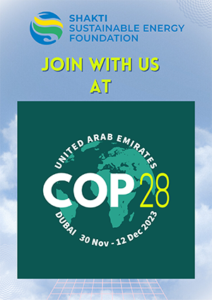
Venue: Regional Climate Foundations Pavillion- COP28 (Pavilion No – TA3-145), Blue zone– B7 and building 88 (Ground floor of building 88, left-hand side)
Date: December 2, 2023
Time: 10:00 to 11:30 GST
Moderator: Ms Nidhi Madan, Associate Director, Climate Change, Shakti Sustainable Energy Foundation
Panelist:
- Mr Srinivas Krishnaswamy, Chief Executive Officer, Vasudha Foundation
- Mr Madhav Pai, Chief Executive Officer, WRI India
- Dr Soumen Maity, Vice President, Society for Development Alternatives
- Mr Nikhil Kolsepatil – Program Coordinator- Energy & Climate, ICLEI- South Asia
- Ms Shailly Kedia, Senior Fellow and Associate Director, The Energy and Resources Institute
Concluding remarks: Mr Shubhashis Dey, Director Climate Policy and Climate Finance, Shakti Sustainable Energy Foundation
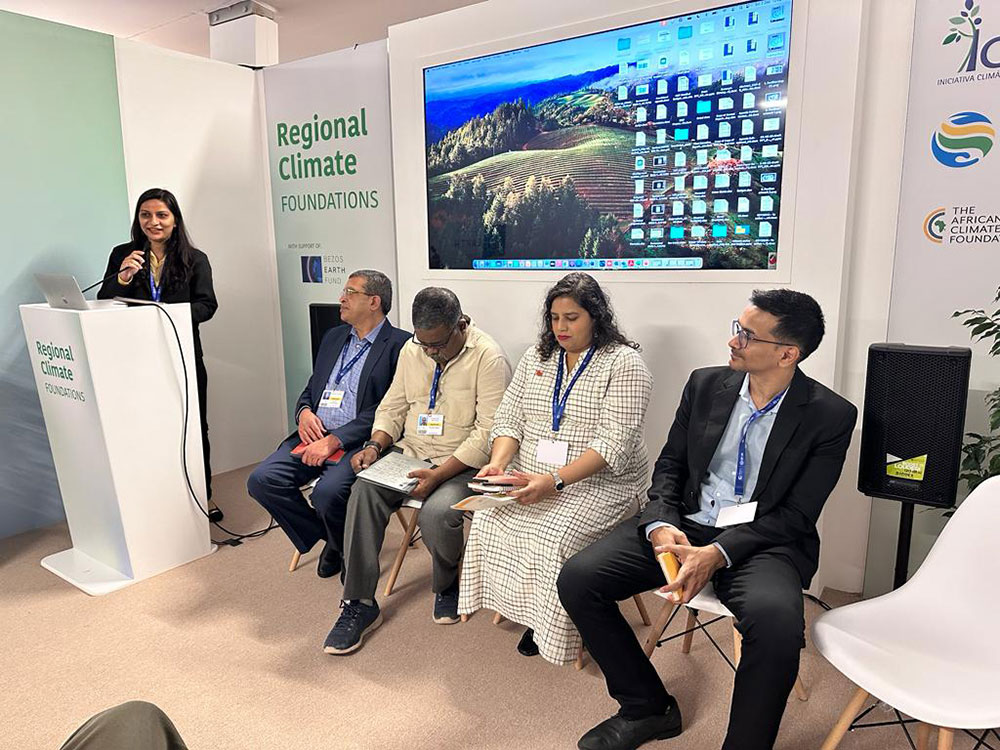
Honourable Prime Minister of India, Shri Narendra Modi, proposed to organise COP33 (Y2028) in India. India had organised COP8 in the year 2008 and much has happened on climate actions in last twenty years. One positive outcome is the evolution of a bottom-up approach where India states and cities have taken prominent position in designing and implementing climate change strategies in line with national priorities and local realities. The other positive outcome is the creation of a vibrant Indian civil society ecosystem where home-grown and international CSOs are supporting central, state and city governments in developing and executing ambitious climate policies which are based on credible evidence. However, as the window of opportunity for arresting climate change is narrowing, a panel of distinguished climate experts from India deliberated on the following issues:
- Effective implementation of sub-national low-carbon development plans
- Implementation of district and city-level climate action plan
- Tools for Climate Vulnerability Assessment, Monitoring and Evaluation, Green Budgeting etc. for planning low-carbon strategies
- Measures to plan for the hard-to-abate sectors (such as industry, waste, etc.)
- Top challenges faced during sub-national planning and possible solutions to overcome them
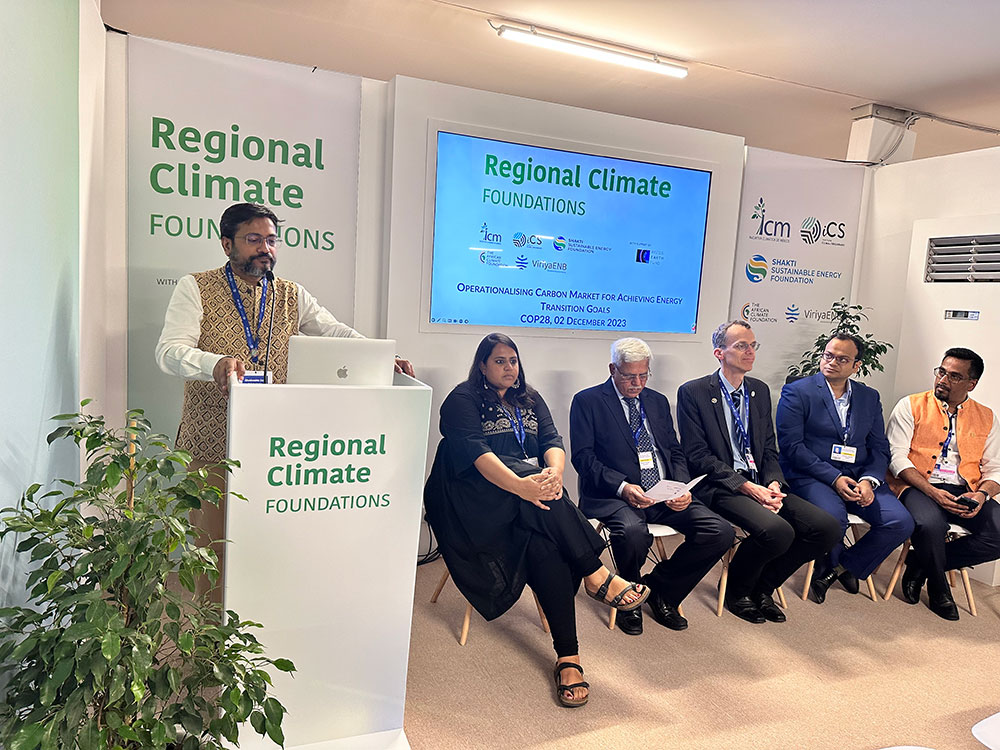
The event, ‘Energy Transition Planning at the Sub-national Level,’ moderated by Nidhi Madan, Associate Director, Climate Policy, Shakti Sustainable Energy Foundation, focused on the collaborative efforts required from sub-national entities to achieve India’s 2070 net-zero emissions target and ambitious short-term climate goals. Given their vulnerability to climate risks and role in local-level actions, these entities play a pivotal role. The event aimed to explore opportunities in translating national climate goals to the sub-national level.
Speaker’s bios
Mr Srinivas Krishnaswamy, Chief Executive Officer, Vasudha Foundation
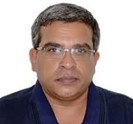 Srinivas is an economist by training and is currently the Chief Executive Officer of Vasudha Foundation, a not for profit think tank, CSO, set up him in April 2010 and working in the clean energy, climate policy space.
Srinivas is an economist by training and is currently the Chief Executive Officer of Vasudha Foundation, a not for profit think tank, CSO, set up him in April 2010 and working in the clean energy, climate policy space.
An institutional builder, Srinivas, as the founder-CEO of Vasudha Foundation, has led Vasudha Foundation to be recognized as one of the leading CSOs in the clean energy and climate policy space in India. He has been actively involved in conceptualizing and designing several pioneering and unique projects in the clean energy and climate policy space.
Further, under his stewardship Vasudha Foundation has forged a number of partnerships with leading Policy Think Tanks such as NITI Aayog and also with a number of state governments on a wide range of issues from developing net zero vision and pathways to facilitating the developments of action plans to localize climate action.
Srinivas is also part of many international networks on clean energy and climate such as the Climate Action Network International, International Climate Policy Hub, World Bank Civil Society Policy Forum amongst others and more recently is a member of core steering committee for net zero emissions management of the Civil 20 grouping of the India G20 Presidency.
Mr Madhav Pai, Chief Executive Officer, WRI India
 Madhav is a respected thinker-practitioner who has been working on issues of urbanization, climate change and environment in various countries over the past few decades.
Madhav is a respected thinker-practitioner who has been working on issues of urbanization, climate change and environment in various countries over the past few decades.
Madhav joined WRI India in 2008 to become part of the Institute’s founding team. He has played a definitive leadership role at WRI India that has helped it reach its present position. He has conciously invested his energies in nurturing talent to build large, high-performance teams at WRI India that can support the design, implementation and scaling up of pioneering solutions to India’s complex challenges.
Under his leadership as Executive Director of WRI India Ross Center and Director of EMBARQ India, the team has supported implementation of several pioneering projects. Notable successes include the Indore BRT, the Mumbai Climate Action Plan (MCAP), the Raahgiri campaign for democratizing public streets, and the National Electric Bus Program (NEBP). The team has also informed multiple national, state, and city level policy discussions on urban and regional planning, road safety, urban transport, transit-oriented development, electric mobility and clean air.
Dr Soumen Maity, Vice President, Society for Development Alternatives
 Dr. Soumen Maity holds a PhD in Materials Science from Central Glass and Ceramic Research Institute (CSIR). After a brief stint in CSIR, he joined Development Consultant Limited, Kolkata and was instrumental in managing a R&D Group on developing low cost building materials. During this period, he had set up two start-up companies, producing studio potteries and alternate building materials. Presently he is with Development Alternatives Group, leading the Innovation to Commercialization value chain under Technology and Action for Rural Advancement (TARA). His current sectors of interest are industrial waste utilization, resource efficiencies of small scale technologies, alternate building materials and technologies and low carbon cement. Dr. Soumen is also the Team Leader at TARA leading the Limestone Calcined Clay Cement (LC3) initiatives in India, Africa, Middle East and Asia and is supporting cement and associated companies in transferring the LC3 technology in a commercial manner.
Dr. Soumen Maity holds a PhD in Materials Science from Central Glass and Ceramic Research Institute (CSIR). After a brief stint in CSIR, he joined Development Consultant Limited, Kolkata and was instrumental in managing a R&D Group on developing low cost building materials. During this period, he had set up two start-up companies, producing studio potteries and alternate building materials. Presently he is with Development Alternatives Group, leading the Innovation to Commercialization value chain under Technology and Action for Rural Advancement (TARA). His current sectors of interest are industrial waste utilization, resource efficiencies of small scale technologies, alternate building materials and technologies and low carbon cement. Dr. Soumen is also the Team Leader at TARA leading the Limestone Calcined Clay Cement (LC3) initiatives in India, Africa, Middle East and Asia and is supporting cement and associated companies in transferring the LC3 technology in a commercial manner.
Ms Shailly Kedia, Senior Fellow and Associate Director, The Energy and Resources Institute
 Dr Shailly Kedia is a multidisciplinary research professional who is a Senior Fellow and Associate Director with the Centre for Sustainable Development Research and Leadership at The Energy and Resources Institute (TERI), New Delhi. Dr Kedia has over 17 years of experience in policy research, outreach, and capacity building. Her core research interests include mainstreaming sustainable development, green budgeting, sustainable consumption and production, interfaces with climate policy, international organizations, traditional and non-traditional security issues. She also curates TERI’s flagship initiative – the World Sustainable Development Summit. In the past, Dr Kedia has worked with the Sustainable Development Network of the World Bank in Washington, DC, and with the Center for Climate Systems Research at Columbia University and NASA Goddard Institute for Space Studies in New York. Dr Kedia is a Bachelor of Engineering (Electrical Engineering) from the National Institute of Technology, Surat, and Master of Business Administration (Finance) from University of Stirling, Scotland. She pursued a Post-baccalaureate Elective from the School of International and Public Affairs at Columbia University and has a doctoral degree in International Organization from the School of International Studies, Jawaharlal Nehru University, New Delhi. She recently completed an Executive Leadership Development Program at the Harvard Business School. She has published in Global Environmental Change, Maritime Affairs, Millennial Asia, and Advances in Climate Change Research.
Dr Shailly Kedia is a multidisciplinary research professional who is a Senior Fellow and Associate Director with the Centre for Sustainable Development Research and Leadership at The Energy and Resources Institute (TERI), New Delhi. Dr Kedia has over 17 years of experience in policy research, outreach, and capacity building. Her core research interests include mainstreaming sustainable development, green budgeting, sustainable consumption and production, interfaces with climate policy, international organizations, traditional and non-traditional security issues. She also curates TERI’s flagship initiative – the World Sustainable Development Summit. In the past, Dr Kedia has worked with the Sustainable Development Network of the World Bank in Washington, DC, and with the Center for Climate Systems Research at Columbia University and NASA Goddard Institute for Space Studies in New York. Dr Kedia is a Bachelor of Engineering (Electrical Engineering) from the National Institute of Technology, Surat, and Master of Business Administration (Finance) from University of Stirling, Scotland. She pursued a Post-baccalaureate Elective from the School of International and Public Affairs at Columbia University and has a doctoral degree in International Organization from the School of International Studies, Jawaharlal Nehru University, New Delhi. She recently completed an Executive Leadership Development Program at the Harvard Business School. She has published in Global Environmental Change, Maritime Affairs, Millennial Asia, and Advances in Climate Change Research.
Mr Deepak Yadav, Programme Lead, Council on Energy, Environment and Water
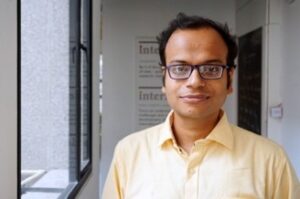 An engineer by education and experience, Deepak works on the sustainability analysis of low carbon and renewable technologies for industrial decarbonisation. At the Council, his work involves developing a roadmap for hard-to-decarbonise industrial sectors, engaging with industry partners on carbon mitigation strategies and supporting policy-making with insightful analysis.
An engineer by education and experience, Deepak works on the sustainability analysis of low carbon and renewable technologies for industrial decarbonisation. At the Council, his work involves developing a roadmap for hard-to-decarbonise industrial sectors, engaging with industry partners on carbon mitigation strategies and supporting policy-making with insightful analysis.
Deepak is currently focussing on alternative fuels, renewable hydrogen and low-carbon energy sources such as natural gas for mitigating industrial emissions. His research involves technology assessment and forecasting, economic analysis and life cycle assessment of competing technologies for enabling transition in the industrial sector. Prior to joining the Council, he worked as a project engineer in the conceptualisation-to-commissioning of a megawatt-scale concentrated solar power (CSP) plant.
Deepak holds a doctorate and a Master’s degree, both from the Department of Energy Science and Engineering, IIT Bombay. He is also a BEE certified energy auditor. He is a seasoned researcher and has published his research in leading international journals and conferences. His areas of interest include industrial sustainability, renewable energy, alternative fuels, and the power sector.
Mr Nikhil Kolsepatil – Program Coordinator- Energy & Climate, ICLEI- South Asia
 Nikhil joined ICLEI South Asia in November, 2013 and has a Master’s degree in Energy Technology from the Asian Institute of Technology, Thailand and a Bachelors degree in Mechanical Engineering. He has diverse experience of working in areas of energy and climate change with city governments, national and international organizations, technical experts and businesses. Nikhil is also a certified lead auditor for ISO 50001 Energy Management System.
Nikhil joined ICLEI South Asia in November, 2013 and has a Master’s degree in Energy Technology from the Asian Institute of Technology, Thailand and a Bachelors degree in Mechanical Engineering. He has diverse experience of working in areas of energy and climate change with city governments, national and international organizations, technical experts and businesses. Nikhil is also a certified lead auditor for ISO 50001 Energy Management System.
He is managing the execution of various projects and programmes as part of ICLEI’s Energy & Climate team. Nikhil is engaged in assisting cities through activities such as preparation of baseline energy and GHG emission inventories, energy and climate action planning, identification and implementation of renewable energy and energy efficiency solutions, undertaking technical research and analysis, stakeholder engagement and coordination among others.
Nikhil is currently working with Indian cities to assess their feasibility and potential to deploy efficient district cooling systems under UNEP’s District Energy in Cities Initiative. He has been involved in an Asian Development Bank assignment to carry out an investment grade energy audit for a LED street lighting retrofit project for 100,000 streetlights in Malaysia. Under the CapaCITIES project, he is assisting cities to address climate mitigation and adaptation in an integrated manner. He also supports ICLEI South Asia in its activities as the Asia LEDS Partnership Secretariat and manages ICLEI’s GHG emissions inventory tool HEAT+. Nikhil has been engaged in previous projects such as Urban LEDS, Urban Green Growth Strategies for Indian cities, and NAMA research study in India.
